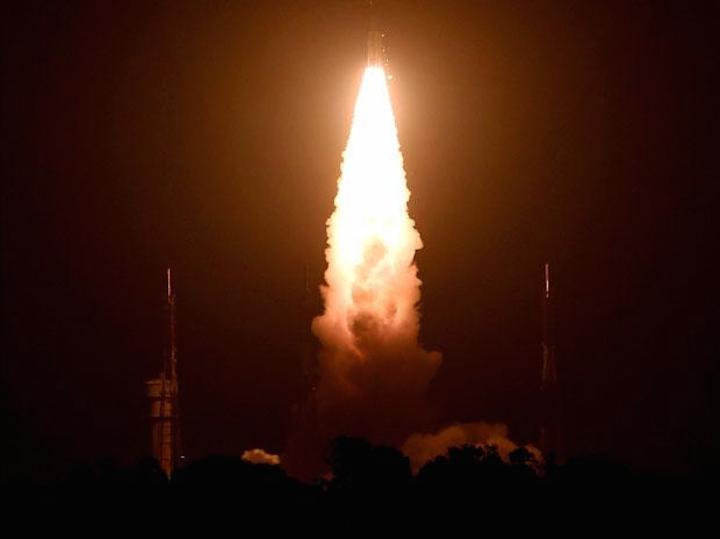Supports start-up that makes micro-thermal thrusters
The Indian Space Research Organisation will launch 28 commercial satellites along with CartoSat-2 satellite in the second half of December.
Addressing reporters to announce ‘International Seminar on Indian Space Programme: Trends and Opportunities for Industry’, supported by Ficci and ISRO’s commercial arm Antrix Corporation, ISRO Chairman AS Kiran Kumar said that out of the 28 commercial satellites, 25 are nano and three are micro.
ISRO has been improving its launches, he said. “Now we are doing 8-10 launches a year; our aim is 18 per year,” Kumar said, and added “It is here we need private participation.”
S Rakesh, Chairman and Managing Director, Antrix Corporation, said: “The corporation so far has ₹850 crore firm orders in its book. Another ₹250-300 crore are work in progress.
“Antrix in total has orders to launch 200 satellites belonging to 29 countries.”
Kumar said: “ISRO is not lagging behind in supporting or nurturing start-ups. A small company, Bellatrix Aerospace, started by young people, have successfully got a contract to develop micro-thermal thrusters. “After our experience in working with this start-up, ISRO is planning to set up an incubation centre to handhold and encourage start-ups, to grow and capture a share of the global space market.”
Vivek Pandit, Assistant Secretary General, Ficci, said: “The objective of the two-day (November 20-21) conference in New Delhi is to deliberate on the best practices, pursue the ongoing discussion process to support further work of the Indian space sector and facilitate private participation.” He said that during the seminar, stakeholders, policy makers, thought leaders and academia will also brainstorm on enabling and encouraging government policies to target both domestic and global markets.
Quelle: BL
---
Update: 30.12.2017
.
ISRO will launch 31 satellites on January 10

India will launch 31 satellites, including the earth observation spacecraft Cartosat on January 10, from its spaceport at Sriharikota in Andhra Pradesh, an official said on Saturday.
“We have tentatively scheduled the rocket launch at 9.30 a.m. to carry Cartosat and other satellites, including 28 from the US and five other countries in a single mission,” Indian Space Research Organisation (ISRO) Director Devi Prasad Karnik told IANS here.
The first space mission in 2018 onboard the Polar Satellite Launch Vehicle (PSLV-C40) comes four months after a similar rocket failed to deliver the country’s eighth navigation satellite in the earth’s lower orbit on August 31.
“The sixth Cartosat in the second series and other satellites are integrated with the rocket at the spaceport. The mission launch board will decide the rocket’s lift-off time for the reverse countdown two days ahead,” said Karnik.
The mission’s payload will also include one each nano and micro satellite from India, besides Cartosat-2.
As an observational satellite, Cartosat will beam high-quality images for cartographic, urban and rural applications, coastal land use and regulation and utility management like road network monitoring.
The previous two satellites in the Cartosat-2 series were launched on June 23 and February 15, from the spaceport on the east coast, about 90km up Chennai.
As a follow-on mission, Cartosat will also relay high resolution scene specific spot imageries with data from its panchromatic and multi-spectral cameras operating in time delay integration mode.
The space scientists are taking special measures to ensure the 44.4 metre rocket will sling the 720kg Cartosat and other satellites one-after-one into their intended orbits.
“The August 31 mission suffered a setback when the 320-tonne workhorse launcher (PSLV-C39) did not separate the heat shield to deliver the spare satellite in the Indian Remote Navigation Satellite Series (IRNSS-H) from its cone-shaped top-end,” recalled another official.
To make up for the lost time when launches were held up for four months pending inquiry into the August 31 mission failure, the space agency plans to have at least one launch a month in 2018.
“We have lined up five-six launches in the first half of next year, including two for deploying GSAT-6A and GSAT-29 advanced communication satellites in the geo-synchronous orbit (36,000km above earth),” asserted the official.
The space agency will also launch its second lunar mission (Chandrayaan-2) to the moon, with an orbiter, lander and rover for the first time.
The 3,290 kg Chandrayaan-2 will orbit around the moon and study its lunar conditions to collect data on its topography, mineralogy, exosphere and the “presence” of water ice and hydroxyl.
On reaching the 100 km lunar orbit, the lander with the six-wheeled rover will separate from the spacecraft and descend slowly to soft land on the lunar surface at a designated spot.
“The rover will move around the landing site in semi-autonomous mode as per the ground commands while its instruments will observe the lunar surface and transmit the data for analysis of its soil,” added the official.
Quelle: BGR
+++
ISRO to launch 31 satellites in one go aboard PSLV
The Indian Space Research Organisation (ISRO) on Friday said it would launch 31 satellites, including India’s Cartosat-2 series earth observation space craft, in a single mission on January 10.
The mission will be the first ‘Polar Satellite Launch Vehicle’ (PSLV) mission after the unsuccessful launch of the navigation satellite IRNSS-1H in August this year.
“The launch is tentatively scheduled for January 10,” a senior ISRO official said.
The mission’s main payload would be India’s Cartosat-2 series earth observation satellite. The high-profile Mission Readiness Review committee and Launch Authorisation Board is scheduled to meet soon to take the final call.
PSLV-C40 will be used for the launch from the spaceport in Andhra Pradesh’s Sriharikota, about 100 kilometres from Chennai.
The mission would be a combination of 28 nano satellites from abroad, including Finland and the U.S., one micro and one nano satellite from India along with one Cartosat satellite, the official said.
On August 31, India’s mission to launch its backup navigation satellite IRNSS-1H on board PSLV-C39 was unsuccessful after a technical snag on the final leg.
In February this year, PSLV-C37 launched the first Cartosat-2 series satellite along with 103 co-passenger satellites in a single flight.
Quelle: The Hindu
---
Update: 8.01.2018
.
India to launch 31 satellites on January 12
BENGALURU: India will launch 31 satellites, including earth observation spacecraft Cartosat, on January 12 instead of its earlier tentative schedule on January 10, a space official said on Monday.
"The rocket launch to carry Cartosat and other satellites, including 28 from the US and five other countries, will take place on January 12 at 9.30 a.m.," Indian Space Research Organisation (ISRO) Public Relations Director Devi Prasad Karnik told IANS here.
"There is no delay in the schedule as the earlier stated launch date of January 10 was merely tentative," stated Karnik.
The rocket launch would take place from ISRO's spaceport located at Sriharikota in Andhra Pradesh.
The first space mission in 2018 on board the Polar Satellite Launch Vehicle (PSLV-C40) comes four months after a similar rocket failed to deliver the country's eighth navigation satellite in the earth's lower orbit on August 31.
The mission's payload will also include one each nano and micro satellite from India, besides Cartosat-2.
As an observational satellite, Cartosat will beam high-quality images for cartographic, urban and rural applications, coastal land use and regulation and utility management like road network monitoring.
Quelle: Indo-Asian News Service
---
Update: 11.01.2018
.
Countdown begins for ISRO’s 100th satellite launch

SRO's PSLV C38 carries earth observation satellite Cartosat-2 Series and 30 co-passenger satellites of various countries. | Photo Credit: PTI
The 28-hour countdown for the launch of ISRO’s 100th satellite along with 30 others in a single mission, from the space port of Sriharikota, about 110 kms from here, began on Thursday.
On its 42nd mission, the Indian Space Research Organisation’s (ISRO) trusted workhorse ‘PSLV-C40’ will carry the weather observation ‘Cartosat-2’ series satellite and 30 co-passengers (together weighing about 613 kg) at lift-off at 9.28 am on Friday.
As the Mission Readiness Review committee and Launch Authorisation Board cleared the countdown, the space body said, “The 28-hour countdown activity of PSLV-C40/Cartosat2 Series Satellite Mission has started at 05.29 hours IST today.”
At present, the scientists are involved in propellant filling operation to carry out various stages of the flight, it said.
The 44.4 metre tall rocket is all set to lift off from the first launch pad of the Satish Dhawan Space Centre at Sriharikota.
The co-passenger satellites comprise one micro and nano satellite each from India as well as three micro and 25 nanosatellites from six countries — Canada, Finland, France, Korea, the United Kingdom and United States of America.
The total weight of all the 31 satellites carried on-board PSLV-C40 is about 1,323 kgs.
The 28 international customer satellites are being launched as part of the commercial arrangements between ISRO and its commercial arm ‘Antrix Corporation Ltd’.
Of the total number of satellites carried by PSLV-C40, 30 satellites will be launched into a 505 kms polar Sun Synchronous Orbit (SSO).
Scientists would bring down the height by twice restarting the fourth stage of the PSLV-C40 for launch of Microsat satellite, which will be placed in a 359 kms polar SSO, ISRO said.
The entire launch of satellites is expected to happen over a period of 2 hours and 21 seconds, it said.
According to ISRO, the Cartosat-2 series satellite launch is a follow-on mission with the primary objective of providing high resolution scene specific spot imageries.
It carries panchromatic and multi-spectral cameras operating in Time Delay Integration mode and is capable of delivering high resolution data. This will be the third satellite in the Cartosat-2 series.
ISRO had successfully launched Cartosat-2 Series satellite on June 22, 2016.
The images sent by Cartosat-2 series satellite will be useful for cartographic applications, urban and rural applications, coastal land use and regulation, road network monitoring, water distribution, creation of land use maps and change detection to bring out geographical Land Information Systems and Geographical Information System applications.
ISRO Satellite Centre Director M. Annadurai had recently said the launch of 28 satellites from abroad and three Indian satellites during the mission would mark the roll out of the 100th satellite by the space agency.
Friday’s launch also marks the first launch for ISRO in 2018 following the unsuccessful mission of navigation satellite IRNSS-1H last year.
On August 31, 2017 India’s mission to launch its backup navigation satellite IRNSS-1H on board PSLV-C39 failed after the heat shield did not separate in the final leg of the launch sequence and as a result, the satellite IRNSS-1H got stuck in the fourth stage of the rocket.
Quelle: The Hindu
---
Update: 12.01.2018
.
Erfolgreicher Start von PSLV-C40 mit Cartosat 2
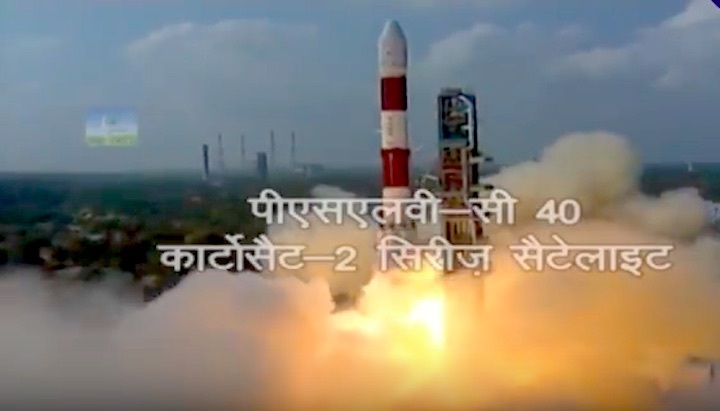

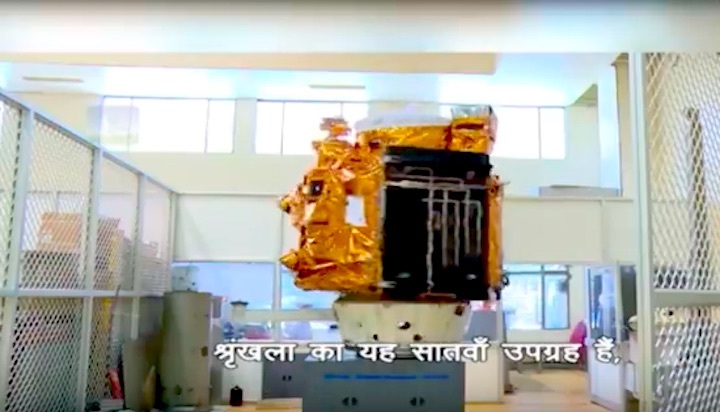




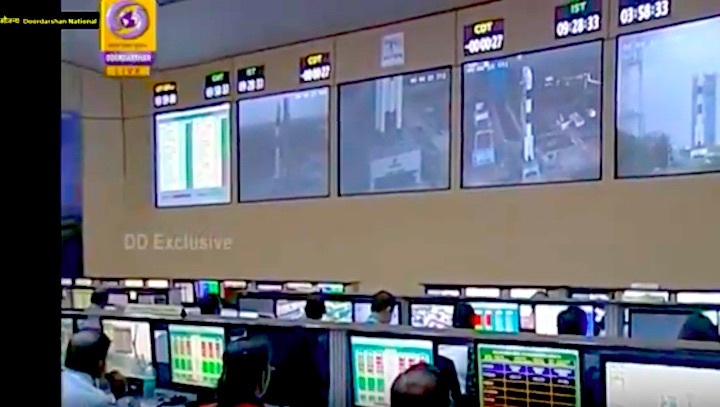


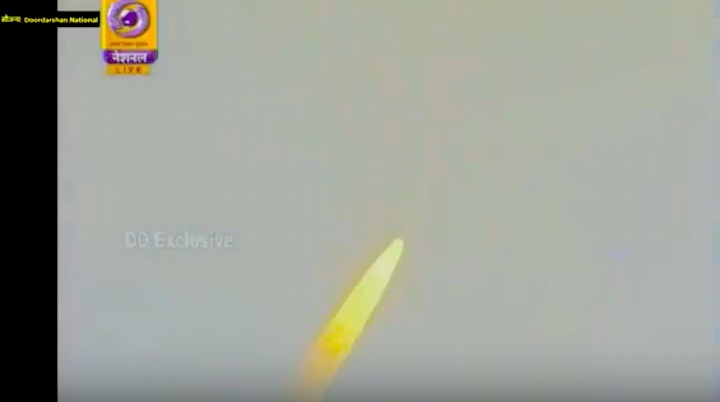



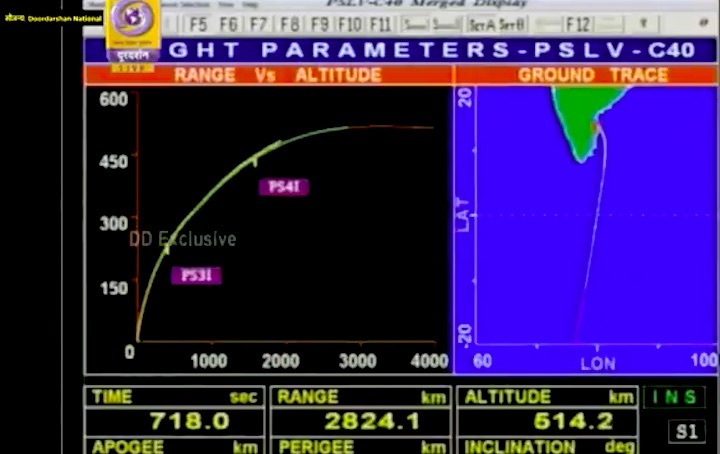
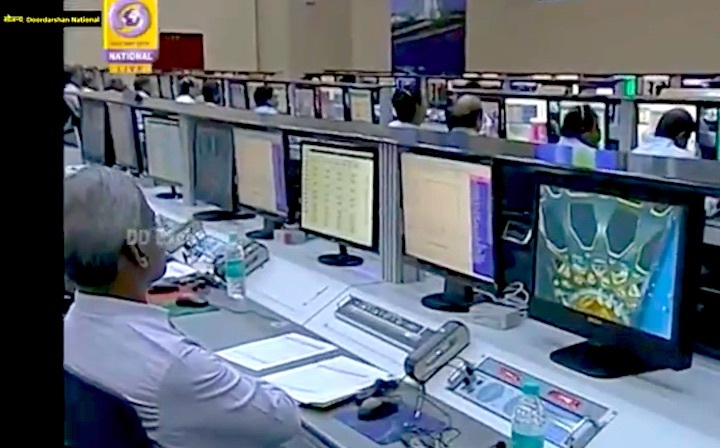



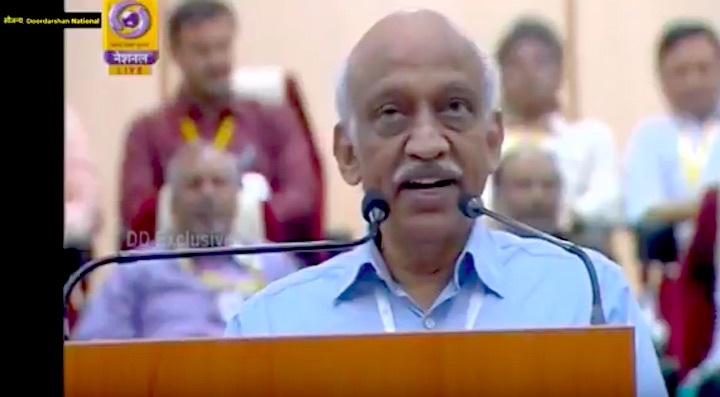
Quelle: ISRO
+++
Isro’s 100th satellite launch - PSLV-C40 Cartosat-2 Series

India's Polar Satellite LaunchVehicle (PSLV-C40), successfully launched the Cartosat-2 Series satellite and 30 co-passenger satellites from the Satish Dhawan Space Centre at Sriharikota on January 12, 2018. Here's a look at the mission and how the satellites were deployed.

Quelle: The Times of India


